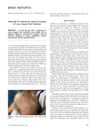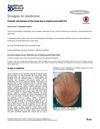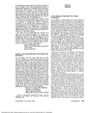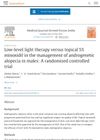 May 2015 in “Journal of The American Academy of Dermatology”
May 2015 in “Journal of The American Academy of Dermatology” 5% minoxidil foam helps women with thinning hair.
 May 2015 in “Journal of The American Academy of Dermatology”
May 2015 in “Journal of The American Academy of Dermatology” Niosomal minoxidil, when applied topically, increases hair count more than conventional minoxidil solution.
January 2014 in “Journal of Clinical Dermatology” Topical minoxidil improves life quality for women with hair loss.
 November 1999 in “Reactions Weekly”
November 1999 in “Reactions Weekly”  269 citations,
August 2002 in “Journal of The American Academy of Dermatology”
269 citations,
August 2002 in “Journal of The American Academy of Dermatology” 5% minoxidil works better for hair growth and density, with minor irritation.
 51 citations,
May 2010 in “Journal of Drug Targeting”
51 citations,
May 2010 in “Journal of Drug Targeting” Transcutol-containing vesicles improve minoxidil's skin penetration and hair growth promotion.
 48 citations,
December 2013 in “Drug Delivery and Translational Research”
48 citations,
December 2013 in “Drug Delivery and Translational Research” Niosomes improve minoxidil skin penetration for hair loss treatment.
 44 citations,
October 1989 in “International Journal of Pharmaceutics”
44 citations,
October 1989 in “International Journal of Pharmaceutics” Minoxidil's effectiveness decreases as vehicle evaporates; concentration and thermodynamic activity matter.
 36 citations,
September 2018 in “American Journal of Clinical Dermatology”
36 citations,
September 2018 in “American Journal of Clinical Dermatology” Combination of 0.25% finasteride and 3% minoxidil works better than just 3% minoxidil for increasing hair thickness in women.
 30 citations,
April 1990 in “Clinical Pharmacology & Therapeutics”
30 citations,
April 1990 in “Clinical Pharmacology & Therapeutics” Tretinoin cream boosts minoxidil absorption, possibly improving hair loss treatment.
 29 citations,
April 2019 in “Lasers in Medical Science”
29 citations,
April 2019 in “Lasers in Medical Science” Laser and minoxidil combo promotes better hair growth than minoxidil alone, safely.
26 citations,
December 2019 in “Indian Journal of Dermatology, Venereology and Leprology” PRP combined with minoxidil is the most effective and safe treatment for male pattern baldness.
 20 citations,
September 2015 in “Journal of The European Academy of Dermatology and Venereology”
20 citations,
September 2015 in “Journal of The European Academy of Dermatology and Venereology” Minoxidil foam promotes hair growth and reduces hair loss safely in men.
 19 citations,
January 2015 in “Skin Pharmacology and Physiology”
19 citations,
January 2015 in “Skin Pharmacology and Physiology” Minoxidil foam effectively promotes hair growth and reduces hair loss in men.
 16 citations,
January 2007 in “JEADV. Journal of the European Academy of Dermatology and Venereology/Journal of the European Academy of Dermatology and Venereology”
16 citations,
January 2007 in “JEADV. Journal of the European Academy of Dermatology and Venereology/Journal of the European Academy of Dermatology and Venereology” A man had an allergic reaction to minoxidil, which stopped after he discontinued use and started corticosteroids.
 15 citations,
November 2019 in “Cutaneous and Ocular Toxicology”
15 citations,
November 2019 in “Cutaneous and Ocular Toxicology” Minoxidil tretinoin liposomal based hydrogel shows promise for effective treatment of hair loss by delivering both drugs at the same time.
 15 citations,
May 2017 in “Journal of Dermatological Treatment”
15 citations,
May 2017 in “Journal of Dermatological Treatment” Latanoprost works better for hair growth, and combining it with betamethasone valerate is most effective.
 14 citations,
August 2019 in “Journal of Dermatological Treatment”
14 citations,
August 2019 in “Journal of Dermatological Treatment” 10% minoxidil solution better promotes hair growth and reduces hair loss without significant side effects.
 13 citations,
June 2016 in “Dermatologic Therapy”
13 citations,
June 2016 in “Dermatologic Therapy” Minoxidil works better when applied on a damp scalp than a dry one.
 13 citations,
March 2014 in “Pediatric Dermatology”
13 citations,
March 2014 in “Pediatric Dermatology” Minoxidil 5% solution significantly improved hair density in a girl with loose anagen hair syndrome over 28 months, with no side effects.
 12 citations,
August 2017 in “Archives of Pharmacal Research”
12 citations,
August 2017 in “Archives of Pharmacal Research” Lecithin-based microparticles can deliver minoxidil for hair growth effectively with less skin irritation.
 12 citations,
March 2014 in “ISRN Pharmacology (Print)”
12 citations,
March 2014 in “ISRN Pharmacology (Print)” Minoxidil with tretinoin boosts hair growth most effectively, followed by minoxidil alone, and then ketoconazole.
 3 citations,
May 2020 in “Journal of The European Academy of Dermatology and Venereology”
3 citations,
May 2020 in “Journal of The European Academy of Dermatology and Venereology” Topical booster improves hair loss treatment effectiveness.
 3 citations,
January 2018
3 citations,
January 2018 A woman had an unusual allergic reaction to a hair loss treatment, which cleared up after stopping the treatment and using a different medication.
 2 citations,
December 2019 in “Biomedical dermatology”
2 citations,
December 2019 in “Biomedical dermatology” Minoxidil works faster, but ketoconazole is a safer alternative for female hair loss.
 2 citations,
November 1987 in “Archives of Dermatology”
2 citations,
November 1987 in “Archives of Dermatology” Lotions release minoxidil better than creams, with a recommended mix of propylene glycol, water, and ethanol improving effectiveness.
1 citations,
February 2020 in “PubMed” The topical solution improved hair density and appearance in men with androgenetic alopecia.

10% minoxidil improves frontal hair count more than 5% but has more side effects.
 May 2024 in “Journal of cosmetic dermatology”
May 2024 in “Journal of cosmetic dermatology” Topical finasteride/minoxidil is effective but not better than oral finasteride for hair loss.
 May 2024 in “Medical Journal Armed Forces India/MJAFI”
May 2024 in “Medical Journal Armed Forces India/MJAFI” Both low-level light therapy and 5% minoxidil are effective and safe for treating male hair loss, with no significant difference in results.



























